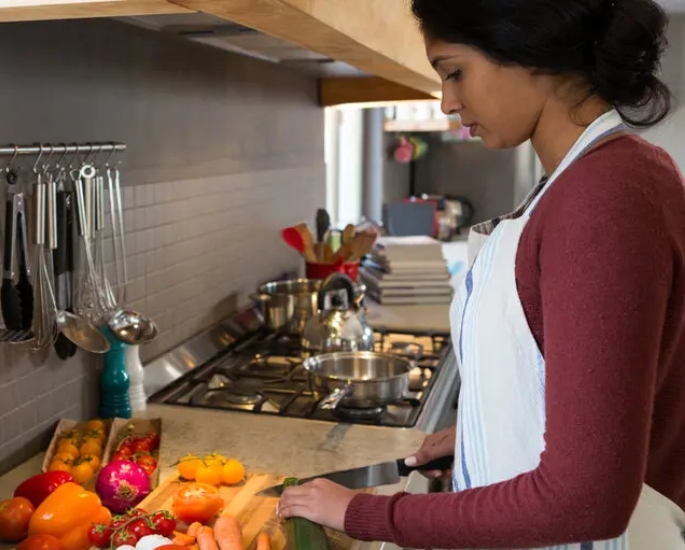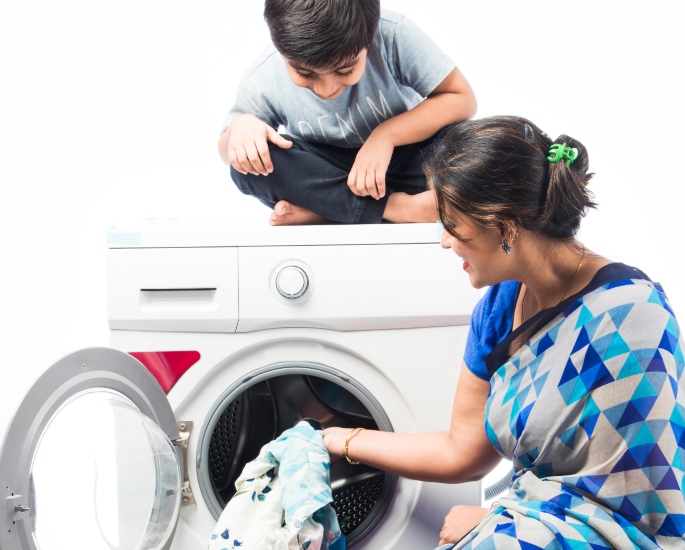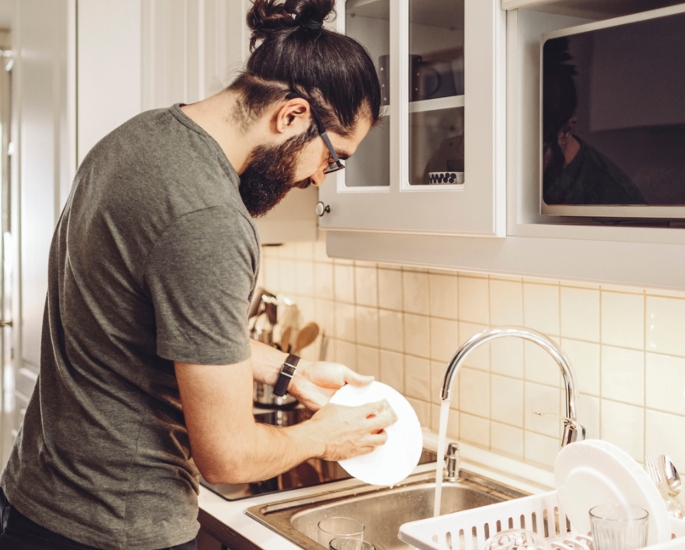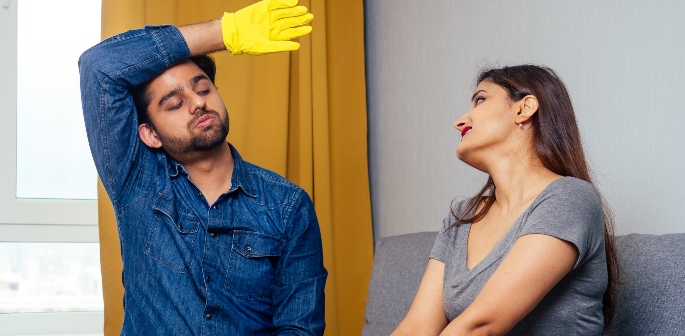"I think men are more open to helping their wives"
Gender roles occur in many parts of everyday family life.
Whether it’s cleaning, cooking, looking after siblings or even taking the bins out, there is often a gendered connotation added to these duties.
History serves that the burden of household duties is the responsibility of women. The age-old patriarchal breakdown of the home still has remnants in the modern world.
Although, it may not be as crystal clear as in the times of a traditional nuclear family.
In 2022, times have changed drastically. It is no longer abnormal for household duties to be distributed more equally.
We are no longer set on a rigid set of duties: husband goes to work; wife stays at home doing the housework and looking after the kids.
Girls achieve higher scores in school and are encouraged to follow their careers. The makeup of a ‘normal’ family is not what it once was.
However, for British Asians, it can be said that gendered household roles are very much apparent.
Women may still be encouraged to strive for academic success and to have career goals.
But is their upbringing within a household still bound to stereotypical expectations and roles? What is the perspective of British Asians when it comes to their duties within the home?
DESIblitz looks at real-life stories and opinions on gender roles within households.
Experiences Growing Up

For children, seeing certain habits when growing up impacts the way they live their lives once they are adults.
When kids are brought up with an expectation of roles within their home, it may perpetuate gender roles once they have children.
But for many British Asians, the gender roles they were burdened with are seen as an unfair ‘preparation for marriage’.
Tasnim Rahman, a 28-year-old public sector officer, speaks about her experience with gender roles growing up:
“It was heavily focused on ‘female’ household tasks.
“For example, we had to learn to cook, clean, and wash and we were expected to be self-dependent from an early age.
“There was a really big focus on looking after myself and a family for when I got married.
“But there was always an imbalance between my mum and dad.
“My dad did hardly anything with the house roles whilst my mum, sister and I did everything for him.”
For Tasnim, her gender role prepared her for a life of looking after other people. Tasnim feels as though she was always getting ready for a future of caring for her husband and family.
Although, she does touch upon the benefits of being taught the importance of certain tasks:
“I was taught to stand on my own two feet.
“My parents urged me to get a part-time job at 16 and I have been financially independent.
“I just do not see why the women in my family had to carry the burden whilst my dad did hardly anything.”
For women, this reality is not a new concept. For thousands of years, women have handled household chores.
The question arises, what are the roles for men in households growing up?
Nahid Wazed, a 28-year-old senior analyst comments on his gender roles growing up:
“My parents expected my brother and I to do the same as the women in the house.
“So cleaning, washing and other chores around the house were all things we had to do.
“The only aspect I felt that was dictated by gender was cooking. I feel like cooking is still a gendered role, it is seen as a woman’s job.
“My parents never expected us to cook but my sisters were taught.
“My brother and I did learn to cook but my sisters were expected to take it way more seriously.
“That was only when they were around 16, though.
“Up until then, my sisters and I had a similar upbringing with gender roles and there was not as much of a divide.”
For Nahid, the roles in his house were not as rigidly split as others.
His participation was a significant one and he feels as though his sisters were not left to carry the burden of all the household jobs.
Gender Roles as a Young Adult

Gender roles within the household are a product of a patriarchal society.
Women, in history, have played a subservient role to the men in their lives and there are countless stories that back this up.
The division of household labour is no different.
For British Asians in 2022, many still feel the pressures of gender roles.
Zahra Azim, a 20-year-old student, talks about her frustrations with the disparity between the roles of women and men she experiences within her home.
“Girls have to slave away in the kitchen whilst the men sit and do nothing. This is especially during dawats (family gatherings).
“Even if it is tea or deserts, women do it all.
“To make it worse, men eat first. It doesn’t make sense because they normally do not do anything.
“Girls are expected to know how to be hospitable, to know how to run a household.
“Parents say that this is so they are ready for marriage. Cooking, cleaning, it is all stuff that is drilled into girls.
“Obviously most people do that, but we are EXPECTED to do this for our mother in laws too.
“You must learn at home, and then do it for another family once you get married as well.
“Of course, it isn’t fair, there’s always going to be a difference between men and women within the house – that’s just the way it is.
“But there are things that men should and can do, but don’t.
“Something as simple as making tea. Girls are expected to make tea for everyone.”
Maria, a 20-year-old student shares her similar belief on gender roles within British Asian households.
“There is still an idea of men being the breadwinners and women being expected to play the ‘housewife’.
“I do not believe in that; it just feels like it is the norm.
“Something needs to change; we see a lot of men in the house who do not participate in jobs they could easily do.”
For the women we spoke to, there was a resounding belief that men still do not play an equitable part in household roles.
This is a belief shared by many men also. Mobin Chowdhury*, a student based in Birmingham, talks about his views on gender roles in 2022:
“I have always been lectured on why basic household chores should not be gendered as much as they are or have been in the past.
“My sister is much younger, so she was not around for the majority of my life.
“This meant my parents expected my brother and I to know how to play our roles in the house.
“There were no women apart from my mum in the house so the boys could not be lazy.
“My mum hates it how the women in British Asian households are expected to do the majority of jobs.
“She firmly believes that teaching her boys to get rid of notions of ‘gendered roles’ will help minimise the divide in the future.
“I agree with her. I see a lot of girls given the burden of carrying the household. It is not every household, but it is not as equal as it should be.
“I am lucky that I grew up helping my mum, it wouldn’t feel right if she was left to do it all.
“I believe that it is not as split in terms of gender roles as it was in the past.
“In 2022, we should be working to eliminate this feeling of gendered roles and I think a lot of women are passionate about this too.”
Mobin explains how a lack of women in the house acted as a chance to learn how to participate effectively in the home.
The difference between these genders within the home is still apparent.
In the Gender Equality Index 2021, it was estimated that women spend 2.3 hours on housework whilst men spend only 1.6 hours.
Life After Marriage

We have spoken about the link between gendered household roles and marriage. Many women feel as though they are given roles to prepare for marriage.
It is interesting to hear real-life stories and how gendered roles translate into married life.
Tasnim Rahman reveals her experience after her marriage.
“We are learning to separate the roles in the house more equally.
“I try to get my husband to do more around the house because he is not used to that.
“I persist in having a more equal balance and it has been good having to share the responsibility.
“There also needs to be a willingness for the husband to want to help out.
“It won’t work if the husband is completely against the idea.
“For me, it is about getting to a place where the balance of gender roles is at an equal position.”
Tasnim and her husband are both in full-time work. With the stresses of their occupations, it is no wonder she believes in a more equal balance of chores.
She touches upon her husband not being used to chores like cooking and cleaning.
That may be a product of the concept of ‘gendered roles’ during his upbringing. Of course, there could always be other reasons for it.
For women, having a partner who is willing to help out will emphasise this balance to their children and start a chain reaction for future generations.
Tasnia, a HR manager, speaks about her experience of being married:
“Our roles are pretty equal, he helps a lot.
“But he does not know how to cook, despite living out for university.
“He cleans and does the washing whilst I cook, we balance it out nicely.
“I have to teach him how to cook so that is really the only thing he does not do.
“I think that we both work but I know how to balance the household roles better than he does. Maybe I have had more practice.
“Overall, we have a nice balance, and it isn’t an unfair split. We can both improve but it is definitely a good balance.”
Cooking, again, is a chore which falls to the responsibility of a woman. The root of this may be that, as Nahid explained, cooking is still a gendered subject.
In many South Asian households, the women are the lead cooks. Only in South Asian-themed restaurants do we see a trend of male Desi cooks.
Additionally, gender roles within a marriage depend on the culture of the families.
For the women we have spoken to, their husbands are open-minded and believe that the roles should be split in a more equal way.
This is not the case for everyone. Milon, a 47-year-old shop manager, speaks about her roles when she married in 1993:
“When I got married, the times were different. I had to do a lot for not only my husband but for my in-laws as well.
“It was hard, I could not have a break and I did not enjoy it.
“But in those times, it was expected of the daughters-in-law to carry the burden of the households.”
“The men brought in the money but they did not do anything around the house.
“I had to cook, clean, wash clothes, iron them and look after the children when they came along.
“Nowadays things are better. In 2022, I think men are more open to helping their wives out.
“I also think a lot of people have a condition of not living with their in-laws when looking to get married. This is so they do not get forced to do all the housework.
“It is not perfect now but compared to back then it is miles better.”
Milon explains the dire situation that she, and many other South Asians, faced when getting married.
Cases like hers still occur, but it is far more likely that modern-day marriages are built on a more balanced system.
The Future of Gender Roles

The split between the first, second and third generations of Desi diaspora in the UK is clear to see.
Ideas of dating, marriage, sexuality and other issues have all changed dramatically.
So how do British South Asians feel about the future of gender roles within the homes?
DESIblitz spoke to Nadeem Patel*, a 21-year-old engineering student, about his thoughts:
“I think it will be less divided in the future. Men know how hard it can be for women to have all the roles in the house.
“A lot of men would not want their wives to only carry that burden.
“It is all to do with culture, we are very traditional sometimes as British South Asians.
“But it is up to men to want to help and for women to not expect anything less.
“I think in many cases, women will not settle for less and expect their men to help out.
“Hopefully our generation can be the one that limits the separation of gender roles in the home.”
The future is more promising than what it was in the 80s or 90s.
With the emergence of professional women, who are career-driven and successful, men have fewer excuses not to help out.
The ‘bread-winner’ role is less gendered. Men may still earn more in households but stats show that women are doing increasingly better in academia.
With more relationships consisting of two full-time workers, it can be said that women will have to carry less of the burdens brought by gender roles.






























































